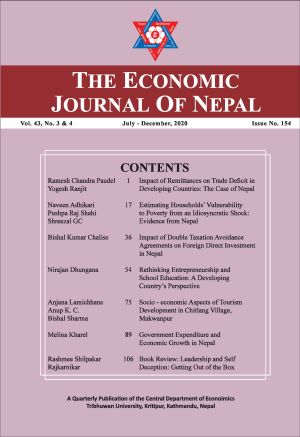Impact of Remittances on Trade Deficit in Developing Countries: The Case of Nepal
DOI:
https://doi.org/10.3126/ejon.v43i3-4.48034Keywords:
Remittances, Trade balance, ARDL ModelAbstract
The paper examines the impact of remittances on trade deficits of Nepal, one of the major concerns of the policymakers and stakeholders at the current time. Using the annual data for the period of about two and a half-decade that is from 1996 to 2019. For this purpose, this paper employs the autoregressive distributed lag (ARDL) approach to co-integration considering the time-series properties of the data. The results show that remittances have a strong positive association with trade deficits. Our findings indicate that remittances have contributed to trade deficits both in the long and short run. It suggests a symptomatic presence of ‘Dutch Disease’ leading to erosion in competitiveness and widening trade deficits. One way to reduce the ever widening trade deficit is to create conducive environment to channel the remittance on capital investment that supports the domestic production capacity. This may in turn help on import substitution and promote the exports.
Downloads
Downloads
Published
How to Cite
Issue
Section
License
© Cedecon-TU




